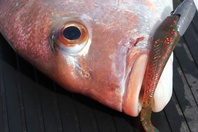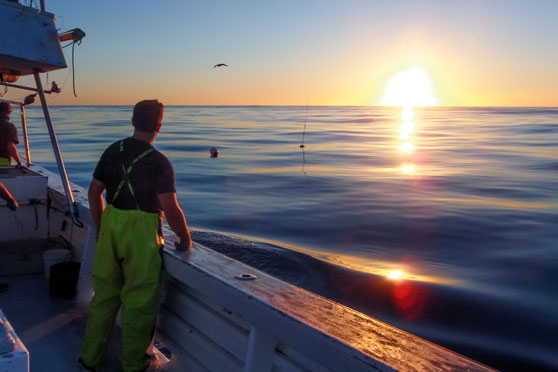MPI onboard fisheries observers
Stewart Alderson is an onboard fisheries observer for MPI. We caught up with Stewart to talk about his role on the frontline with New Zealand’s fishing industry, what it involves, and how he is working to keep our shared fisheries sustainable now and into the future.
Q: How did you become a fisheries observer?
A: This role was a pretty natural fit for me. Growing up near beaches and spending time fishing as a kid fuelled my love of the sea, and I developed a passion for conservation. This, combined with my interest in science, led me to study Marine Biology at Victoria University in Wellington. I took up the observer role after graduating, originally planning to do a year or two, but six years later I’m still here and really enjoying it.
Q: What does your job involve?
A: There is a lot more to the job than most people think. The part people tend to know well is our core requirements on board, like gathering catch and effort data to feed back to Fisheries Management, and also making sure the vessels’ own recordings match up with what we’re seeing. We also collect data on fish processing and fishing activity. A big part of the job people don’t tend to know about is the scientific collection. While on board we take biological samples from about 100 fish a day for size and sex, and I collect ear bones [otoliths] which are sent to NIWA to find out how old the fish is and where it’s come from. This kind of information feeds into scientific reviews of fish stocks and helps MPI to manage fisheries.
We also look at interactions with seabirds and mammals. Any captures are photographed and DNA samples are taken. As well as recording any captures, we look for things that could help reduce seabird and mammal interaction with fishing gear, like if offal discards are attracting sea birds. Another part of the job involves assisting fishers on how to correctly ID fish species and checking to make sure crew onboard know the rules and what’s expected. In most cases we have a conversation first and give people the ability to correct their behaviour or errors. Good communication is key in this role and helps to work through any discrepancies.
Different vessels and deployments have different requirements, too. On some vessels we check labour conditions for workers on board and make sure they are following New Zealand employment laws and being treated well.
Q: What is the best part about your job?
A: There are a lot of things I like about the job. The most rewarding part for me is checking on working conditions for the fishers, and it’s been great to see that over the years I’ve been doing this, conditions are getting better and better for commercial fishers out at sea.
Working in a job where no two days are ever the same is something that appeals to me, too. There are always unexpected things on trips, like one time I was out on a long-liner and we saw an orca teaching her calf how to catch fish! I’ve also been lucky enough to see royal albatrosses and other rare seabirds, which most New Zealander never get a chance to see.
It’s also a great work-life balance and I really like how flexible it is. You let MPI know when you are available for a trip, and then are rostered on around dates that suit. I do around 150 sea days a year, but some observers do more days and some do less. One of our observers does just two trips a year as a semi-retirement gig, so it works well for people’s different situations.
Q: What is the toughest part of the job?
A: While I really like being out at sea and get a lot out of the job, it can be pretty isolating at times. Most trips have only one observer on board, and you’re away from friends and family for up to six weeks. I can send emails, which helps a lot, but sometimes it is a bit tough toward the end of a trip.
Q: Is it hard working and living in close quarters with people on a vessel that you are observing?
A: It’s rare for me to go out on a boat that hasn’t had an observer on board before, so they know the drill. On the smaller boats, or boats that haven’t had an observer before, it can be a bit tougher, but something as simple as offering to make people a cuppa can go a long way to help show you are not going to be in the way or a burden. It helps that I’m there to observe and report, not to give out infringements. Any compliance action is carried out separately by MPI Compliance staff when I’m back onshore. I’ve personally never been in a position where I’ve felt unsafe out at sea.
Q: Why do you think the role of a fisheries observer is important?
A: While most commercial fishers are doing the right thing, it’s good to be out there observing and reporting on what is happening. New Zealanders don’t get to see what commercial fishers are doing in our oceans, so it’s important they know we are checking in to make sure people are doing what they say they are, and that there is independent verification of catch reporting. It’s also important we maintain independent science collection with our biological sampling to help manage the fishery. When I’m taking samples from fish, I’m impartial in the ones I sample. I don’t just pick the biggest to make data look better. The information we collect can be trusted and used as credible, scientific evidence.
Q: What does it take to do the job?
A: We are a pretty diverse bunch from a lot of different backgrounds. A number of us are science graduates, we have quite a few ex-commercial fishers, and we even have a guy who was an insurance-fraud investigator for 20 years before taking on this job! There isn’t anything specific I would say that makes a person ideal for this job, but you need to be okay with being away from home for long periods of time and able to get stuck in and get the job done. I find my science background is really helpful in understanding how important our job is in making sure our fisheries are sustainable for future generations. We are not only making sure commercial fishers are doing the right thing, but getting the scientific information needed to manage our fisheries well.
If you care about our fisheries, can record data accurately and get on with strangers, you can learn the rest in our training
|
|
This article is reproduced with permission of |
Recent Posts Visit Forum
SMUDGE
in The Briny Bar5 hours ago
salty69
Hope you had a good one Smudge.I think Al would have posted something like this....

POPPING VANUATU
in Popper and Topwater Fishing6 hours ago
FarmerBrowne
I have done a couple of trips to the islands with popping gear (Vtu, Tonga (Vavau) and Aitutaki).I think the rod and reel you have planned...

Manukau Harbour & West Coast fishing
in Fishing Reports6 hours ago
FlawOne
Nice one Redfinger, nothing like solid snaps in the shallows! I too had a similar experience over the turn of the low on the Kairpara this...

Out With The over 12's & Under 20's
in Fishing Reports11 hours ago
Pcj
Went out to Kaiaua farm today,no fresh bait only some mullet well buried in the freezer,nice morning to be out but come 1.00pm wind came up.Barge...

Newbie's Personal Best Photos
in Newbies Corner33 hours ago
smudge
sorry about that Sink, he, she or it has gone now...
Popular Articles

Softbait Fishing - Part 1 - gear selection
John Eichlesheim writes an article about selecting the right equipment for softbait fishing... Read More >

Softbait fishing Pt 2 - tips and tricks
Techniques, tips and tricks of softbait fishing – getting the most from your soft baits.... Read More >

Surfcasting - setting yourself up
Gary Kemsley helps sort out the necessary gear for intending surf fishers.... Read More >

Squid - How to catch them
Squid fishing is a rapidly growing aspect of fishing - Paul Senior shares some hints and tips to get started.... Read More >
Fishing Reports Visit Reports
Canterbury Fishing Report - 04/04/24
Fish galore! Coming off the back of Easter Weekend and with some very nice weather... Read More >
Raglan Fishing Report - 04/04/24
Excellent snapper action There is some excellent autumn snapper fishing straight out and up the... Read More >
Bream Bay Fishing Report - 04/04/24
Whangarei Harbour fishing well Like the weather, the fishing has been patchy throughout Bream Bay... Read More >
Hauraki Gulf Fishing Report - 04/04/24
Party time! Inshore fishing and offshore fishing are on now. It’s that perfect time of... Read More >


Comments